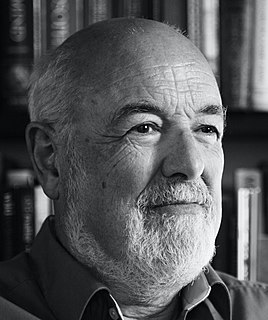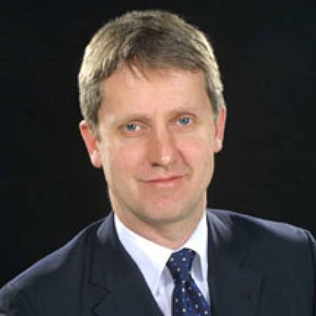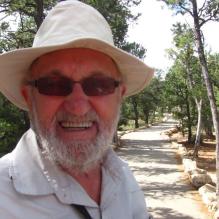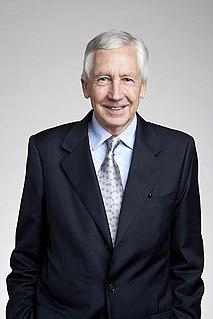
George Armitage Miller was an American psychologist who was one of the founders of cognitive psychology, and more broadly, of cognitive science. He also contributed to the birth of psycholinguistics. Miller wrote several books and directed the development of WordNet, an online word-linkage database usable by computer programs. He authored the paper, "The Magical Number Seven, Plus or Minus Two," in which he observed that many different experimental findings considered together reveal the presence of an average limit of seven for human short-term memory capacity. This paper is frequently cited by psychologists and in the wider culture. Miller won numerous awards, including the National Medal of Science.

David Cyril Geary is a United States cognitive developmental and evolutionary psychologist with interests in mathematical learning and sex differences. He is currently a Curators’ Professor and Thomas Jefferson Fellow in the Department of Psychological Sciences and Interdisciplinary Neuroscience Program at the University of Missouri in Columbia, Missouri.

Geraint Ellis Rees FMedSci is Dean of the UCL Faculty of Life Sciences, UCL Pro-Provost, UCL Pro-Vice-Provost (AI) and a Professor of Cognitive Neurology at University College London. He is also a Director of UCL Business and a trustee of the charities the Guarantors of Brain and in2science

Christopher Donald Frith, is a psychologist and professor emeritus at the Wellcome Trust Centre for Neuroimaging at University College London. Visiting Professor at the Interacting Minds Centre at Aarhus University, Research Fellow at the Institute of Philosophy and Quondam Fellow of All Souls College, Oxford.

Michael I. Posner is an American psychologist who is a researcher in the field of attention, and the editor of numerous cognitive and neuroscience compilations. He is emeritus professor of psychology at the University of Oregon, and an adjunct professor at the Weill Medical College in New York. A Review of General Psychology survey, published in 2002, ranked Posner as the 56th most cited psychologist of the 20th century.

Risto Kalervo Näätänen is a psychological scientist, pioneer in the field of cognitive neuroscience, and known worldwide as one of the discoverers of the electrophysiological mismatch negativity. He has been a much-cited social scientist and one of the few individuals appointed permanent Academy Professor of the Academy of Finland. He retired in 2007, retaining a title of Academy Professor emeritus of the Academy of Finland. Since 2007, he has been a professor at the University of Tartu.

Jonathon Stevens "Jon" Driver was a psychologist and neuroscientist. He was a leading figure in the study of perception, selective attention and multisensory integration in the normal and damaged human brain.
Trevor William Robbins CBE FRS FMedSci is a Professor of cognitive neuroscience and former Head of the Department of Psychology at the University of Cambridge. Robbins has an international reputation in the fields of cognitive neuroscience, behavioural neuroscience and psychopharmacology.

John Morton, OBE, FRS is an emeritus professor at the Institute of Cognitive Neuroscience and was the director of the former Medical Research Council (MRC) Cognitive Development Unit (CDU) at University College London.
Isabel Gauthier is a cognitive neuroscientist currently holding the position of David K. Wilson Professor of Psychology and head of the Object Perception Lab at Vanderbilt University’s Department of Psychology. In 2000, with the support of the James S. McDonnell Foundation, she founded the Perceptual Expertise Network (PEN), which now comprises over ten labs based across North America. In 2006 PEN became part of the NSF-funded Temporal Dynamics of Learning Center (TDLC).
Ian Robertson is a Scottish neuroscientist and clinical psychologist, and Professor of Psychology at Trinity College Dublin.
Jonathan Smallwood is a Professor in the Department of Psychology at Queen's University at Kingston in Ontario, Canada. His research uses the tools of cognitive neuroscience to investigate the process by which the brain self generates thoughts not arising from perception, such as during the experience of mind-wandering and daydreaming. For the last two years he has been recognised as one of the world's most highly cited scientists.

Francesca Gabrielle Elizabeth Happé is Professor of Cognitive Neuroscience and Director of the MRC Social, Genetic and Developmental Psychiatry Centre at the Institute of Psychiatry, Psychology and Neuroscience, King's College London. Her research concerns autism spectrum conditions, specifically the understanding social cognitive processes in these conditions.

Sarah-Jayne Blakemore is Professor of Psychology and Cognitive Neuroscience at the University of Cambridge and co-director of the Wellcome Trust PhD Programme in Neuroscience at University College London
Gordon Logan is the Centennial Professor of Psychology at Vanderbilt University. A cognitive and mathematical psychologist, Logan is well known for his work on cognitive control and inhibition of cognitive and motor activity, divided attention and the nature of the human brain’s processing limitations, and the fundamental characterization of attention deficit hyperactivity disorder ADHD. He has also done extensive research on the hierarchical control of skilled copytyping, which he views as a useful model for hierarchically organized complex human skills in general. He collaborates on research that applies mathematical models to neural and behavioral data.

Sophie Kerttu Scott is a British neuroscientist and Wellcome Trust Senior Fellow at University College London (UCL). Her research investigates the cognitive neuroscience of voices, speech and laughter particularly speech perception, speech production, vocal emotions and human communication. She also serves as director of UCL's Institute of Cognitive Neuroscience.
Professor Warren Meck was a professor in psychology and neuroscience at Duke University. His main field of interest was Interval-Timing mechanisms and subjective time perception. He was editor in chief in the journal of Timing & Time Perception. He introduced an interesting time perception model in 1984 and 2005. He explained that time is created in a dedicated module in the certain internal clock. Meck has over 19,000 citations in google scholar.

Yves-Alain Barde FRS is a Professor of Neurobiology at Cardiff University. He was elected a Fellow of the Royal Society (FRS) in 2017.

Neil Burgess is a Professor of Cognitive neuroscience at University College London and a Wellcome Trust Principal Research Fellow. He has made important contributions to understanding memory and spatial cognition by developing computational models relating behaviour to activity in biological neural networks.
John Aggleton is a British behavioural neuroscientist.












